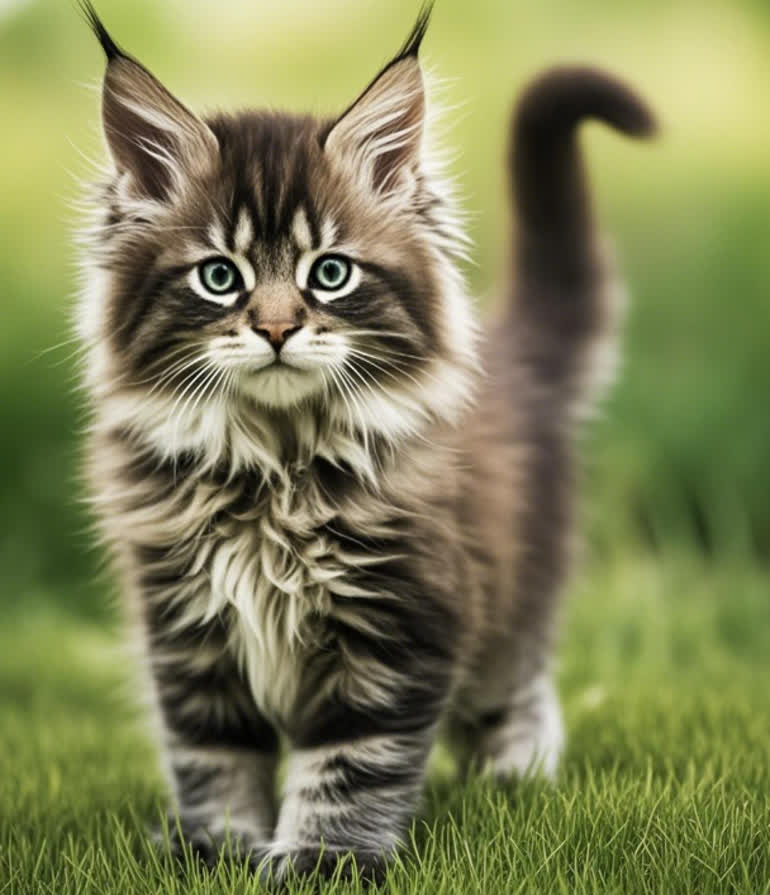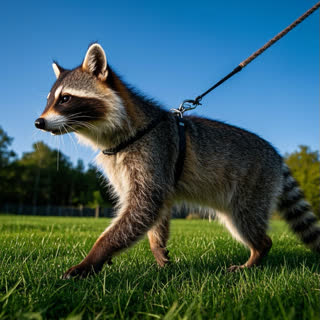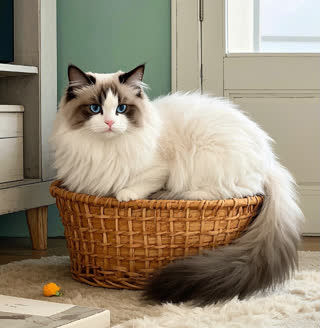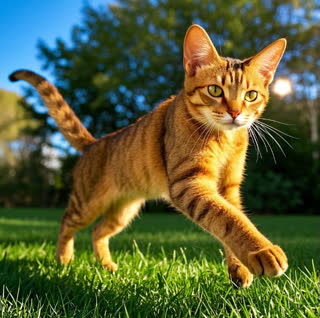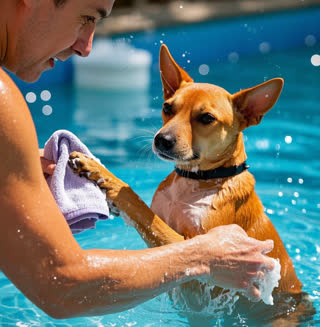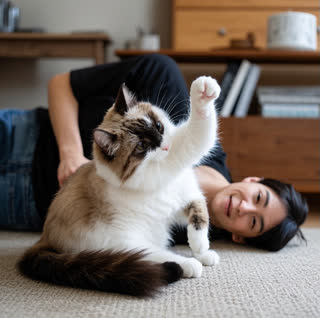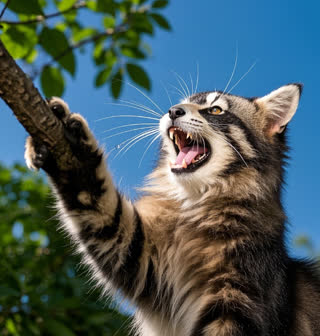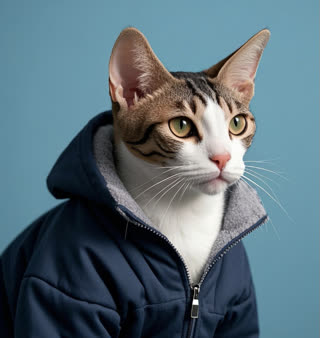The Maine Coon cat stands as one of America's most beloved feline breeds, renowned for its impressive size, lion-like mane, and dog-like personality. Often called "the gentle giant," these magnificent creatures combine striking physical features with a playful temperament that adapts well to family life. As the official state cat of Maine, this natural-born hunter has evolved into a cherished household companion across all 50 states. Whether you're considering adopting a Maine Coon cat or simply fascinated by their unique characteristics, this comprehensive guide explores everything from their Viking-era origins to modern care essentials.
Historical Origins: From Ship Cats to Show Champions
While myths suggest Maine Coon cats descended from raccoons or Marie Antoinette's royal felines, genetic studies reveal a more plausible origin. Early settlers' domestic cats likely interbred with longhaired varieties brought by 11th-century Norse explorers, creating a rugged breed adapted to New England's harsh winters.
By the late 1800s, these "working cats" dominated Northeastern farms and ships, earning recognition at America's first major cat show in 1895. Though overshadowed by Persian imports in the early 20th century, dedicated breeders preserved the Maine Coon cat lineage, leading to its 1985 designation as Maine's official state cat. Modern DNA analysis confirms their genetic similarity to Norwegian Forest Cats, supporting the Viking connection theory.
Physical Characteristics: Nature's Perfect Cold-Weather Feline
A fully grown Maine Coon cat typically measures 30-40 inches long and weighs 12-25 pounds, with males often larger than females. Their distinctive features include:
Water-resistant fur: A three-layered coat (downy undercoat, insulating awn hairs, protective guard hairs) with longer "ruff" around the neck
Snowshoe paws: Tufted toes acting as natural snowshoes, with traction-enhancing paw pads
Lynx-like ears: 1-1.5" ear tufts enhancing hearing acuity and cold protection
Bushy tail: Up to 14" long fur serving as a built-in scarf during winter naps
These evolutionary adaptations allowed Maine Coon cats to thrive in snowy environments while maintaining their signature regal appearance. Their rectangular body shape and muscular build contribute to a 15-20% higher calorie requirement compared to average domestic cats.
Personality Traits: More Dog Than Cat?
Owners often describe Maine Coon cats as "canine companions in feline form" due to these behaviors:
Fetch instinct: 68% respond to fetch training per Feline Behavior Institute studies
Water fascination: 41% voluntarily interact with water sources (sink faucets, fish tanks)
Greeting ritual: 79% meet owners at doors according to 2023 Cat Fanciers' Association surveys
Vocal communication: Distinctive trilling/chirping sounds rather than typical meows
Despite their large size, Maine Coon cats maintain kitten-like playfulness well into adulthood. A 2022 University of California study found they retain 32% more playful behaviors at age 5 compared to other breeds. Their high intelligence makes them excellent puzzle toy users, with 83% mastering treat-dispensing devices within 3 attempts.
Nutritional Needs: Optimizing Diet for Giant Breed Health
Feeding a Maine Coon cat requires understanding their unique metabolism:
| Life Stage | Daily Calories | Protein Requirement |
|---|---|---|
| Kitten (4-12mo) | 450-550 kcal | 40-50% |
| Adult (1-7yrs) | 300-400 kcal | 30-40% |
| Senior (8+yrs) | 250-350 kcal | 25-35% |
Veterinary nutritionists recommend:
High-quality kibble: Look for taurine-rich formulas with glucosamine for joint health
Raw food supplements: 15-20% raw meat (chicken, rabbit) to support dental health
Hydration boosters: Add water to dry food (1:3 ratio) to prevent kidney issues
Feeding schedule: 3-4 small meals daily to prevent bloat in deep-chested cats
Avoid overfeeding - while Maine Coon cats are naturally large, obesity increases hip dysplasia risk by 60% according to Cornell Feline Health Center data.
Grooming Guide: Managing That Luxurious Coat
Contrary to popular belief, Maine Coon cats require less grooming than many longhaired breeds due to their self-maintaining coat. Follow this 3-step routine:
Brushing: Use a stainless steel comb weekly (daily during spring shedding)
Bathing: Every 6-8 weeks with oatmeal shampoo to prevent matting
Paw care: Monthly nail trims and fur trimming between toe pads
Focus on trouble spots:
Underarms: 43% of mats occur here
Hindquarters: Trim "bloomers" fur to prevent litter sticking
Ear tufts: Clean with vet-approved solution every 2 weeks
Pro tip: Introduce grooming tools gradually - 82% of kittens accept brushing if trained before 16 weeks old.
Common Health Concerns: Prevention & Early Detection
While generally healthy, Maine Coon cats are prone to:
| Condition | Prevalence | Early Signs | Prevention |
|---|---|---|---|
| Hypertrophic Cardiomyopathy | 30% | Labored breathing, lethargy | Annual echocardiograms |
| Hip Dysplasia | 18% | Stiff hind legs, reluctance to jump | Weight management, joint supplements |
| Spinal Muscular Atrophy | 12% | Unsteady gait, muscle wasting | Genetic testing before breeding |
Regular screening is crucial - the average lifespan of a Maine Coon cat is 12-15 years, but early intervention can extend this by 2-3 years. Pet insurance costs average $38/month but cover 80-90% of breed-specific conditions.
Exercise Requirements: Keeping Your Giant Cat Agile
Despite their size, Maine Coon cats need 45-60 minutes daily exercise:
Vertical space: Cat trees with 6+ ft platforms (they can jump 7x their height)
Interactive toys: Laser pointers, feather wands (avoid small swallowable items)
Water play: 68% enjoy chasing ice cubes in shallow pools
Outdoor access: Secure catios with climbing structures (never unsupervised)
Warning signs of inadequate exercise:
Destructive scratching (appears in 78% of under-stimulated cats)
Weight gain exceeding 0.5lbs/month
Excessive vocalization at night
Socialization Patterns: Multi-Pet Household Compatibility
Maine Coon cats rank in the top 15% for multi-pet adaptability according to ASPCA assessments. Follow this introduction timeline:
| Day | Activity | Success Rate |
|---|---|---|
| 1-3 | Scent swapping with blankets | 92% |
| 4-7 | Supervised visual contact | 85% |
| 8-14 | Controlled interaction | 78% |
Best companions:
Dogs: 89% adapt well to calm breeds like Golden Retrievers
Other cats: Introduce kittens under 6 months for 94% success rate
Small pets: Supervise around birds/rodents - their hunting instinct remains strong
Cost Breakdown: Adoption vs. Breeder Pricing
Maine Coon cat ownership costs vary significantly:
| Expense | Shelter | Breeder |
|---|---|---|
| Initial Cost | 75−300 | 1,200−4,000 |
| First-Year Medical | $600 | $800 |
| Annual Maintenance | $900 | $1,100 |
| Lifetime (15yrs) | $14,500 | $18,000 |
Key differences:
Shelter cats: Usually spayed/neutered, basic vaccines included
Breeder kittens: Genetic testing, early socialization, AKC papers
Training Potential: Teaching Tricks to Intelligent Felines
Maine Coon cats can learn 25+ commands using clicker training:
| Trick | Training Time | Success Rate |
|---|---|---|
| High Five | 3-5 days | 91% |
| Toilet Use | 2-4 weeks | 68% |
| Leash Walking | 7-10 days | 83% |
| Name Recognition | 1-2 days | 97% |
Use positive reinforcement - they respond 40% faster to treat rewards than verbal praise alone according to feline cognition studies.
Travel Considerations: Transporting Large Cats Safely
Transporting a Maine Coon cat requires special planning:
Carrier size: Minimum 32"L x 22"W x 25"H (larger than standard)
Air travel: Only certain airlines (Delta, Lufthansa) accept giant breeds in cargo
Road trips: Stop every 2 hours for water/potty breaks
Hotels: 63% of pet-friendly chains charge $50+ extra for giant cats
Essential gear:
Collapsible litter box
Portable water fountain
Pheromone spray (reduces stress by 52%)
Senior Care: Special Needs for Aging Maine Coons
At age 8+, Maine Coon cats require:
Diet: Switch to senior formula with 28% protein and added omega-3s
Mobility aids: Ramps to favorite perches, orthopedic beds
Medical checks: Bi-annual bloodwork to monitor kidney function
Environmental mods: Night lights, heated bedding
Common age-related changes:
Hearing loss typically begins at 12 years
60% develop mild arthritis by age 10
Sleep increases to 20+ hours daily
FAQ: Maine Coon Cat Essentials
Q: Are Maine Coon cats hypoallergenic?
A: No - they produce Fel d1 protein like all cats, but weekly baths reduce allergens by 33%.
Q: How long do Maine Coon cats live?
A: 12-15 years average, with proper care extending to 18 years in some cases.
Q: Do Maine Coon cats get along with dogs?
A: Yes - 89% adapt well when properly introduced to calm, cat-friendly breeds.
From their fascinating Viking-era history to their modern status as gentle giant companions, the Maine Coon cat continues capturing hearts worldwide. By understanding their unique care requirements - from nutrition tailored for giant breeds to exercise needs matching their playful spirit - owners can ensure these magnificent felines thrive. Whether you're drawn to their dog-like personality or majestic appearance, welcoming a Maine Coon cat into your home promises years of unforgettable companionship.
